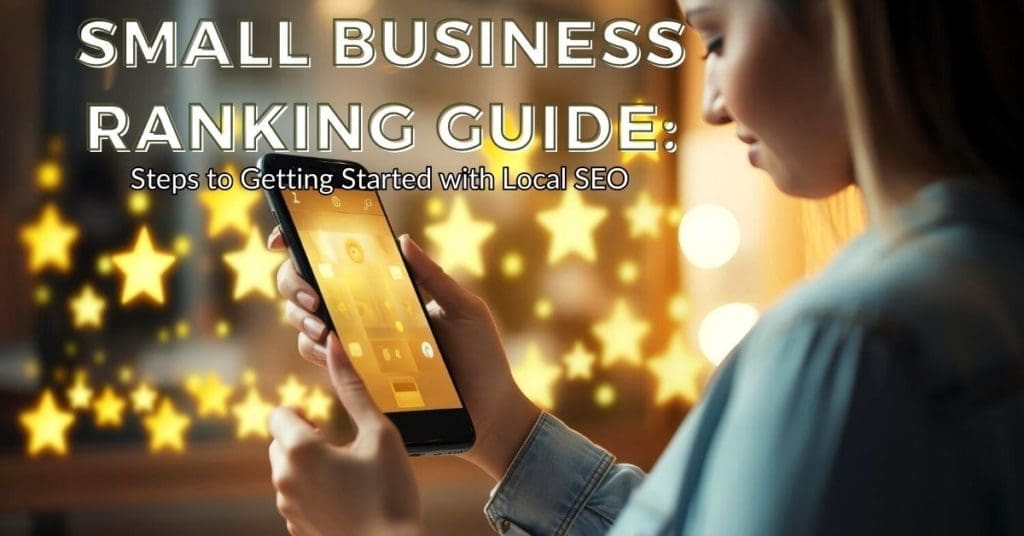Small Business Ranking Guide: Steps to Getting Started with Local SEO
TL;DR
Boost your local SEO with practical tips for more visibility in local search results. Optimize your online presence, claim your Google My Business listing, get positive reviews, and create localized content to attract local customers and increase sales. Local SEO benefits businesses with a physical presence in specific areas and helps establish credibility and trust. Online-only businesses or those targeting a global market may not benefit from local SEO. Adopt a dedicated strategy with keyword research, GMB optimization, building citations, and monitoring efforts. Voice search and mobile search are integral to local SEO success.

Small Business Ranking Guide: Steps to Getting Started with Local SEO
Businesses, are you looking to boost your local SEO? Lucky you! This blog post will teach you practical tips to get more visibility in local search results. Maximize your SEO effort – learn how to make the most of your local searches. This way, you can drive more web traffic and customers!
The Case for Local SEO

Zooming in on Local: Discovering Businesses Right in Your Neighborhood.
Local SEO is key for alien species hoping to snag customers in their local area. Optimizing their online presence for local search queries can give them an edge and help draw in more nearby customers. Let’s explore the steps needed to get started with local SEO and boost your chances of success.
- First, claim and optimize your Google Business Profile listing. This tool is free and lets you make a comprehensive business profile. You’ll have a better chance of appearing in local search results if you include accurate info like address, phone number, and opening hours.
- Next, make sure your NAP (name, address, phone number) info is the same across every online directory and listing. Search engines can tell if your info is legitimate, and customers can find you faster. Consistently update any outdated or wrong info.
- Positive reviews from satisfied customers can also help your rankings. Encourage happy customers to leave reviews on Google, Yelp, or Facebook by providing great service and asking for feedback. Show people you care by responding to positive and negative reviews.
- Finally, localized content can boost your visibility in local searches. Create blog posts or articles relevant to your community or featuring specific products or services tailored to local customers. Incorporate localized keywords into your content for increased relevancy.
By following these steps and tracking and adjusting your local SEO efforts, you can draw in more local customers. Local SEO takes time and effort, but the results can be great. Optimize your online presence, gather reviews, create localized content, and watch your business soar in the local search landscape.
Who Benefits From Local SEO And Why?

Local Heroes: The Faces Behind Thriving Community Businesses.
Local SEO is a great way to boost visibility for businesses with a physical presence in a certain area. By optimizing their website, businesses can appear higher in search engine rankings when customers search for relevant keywords related to their location. This helps them attract more local customers, drive foot traffic to their store, and ultimately increase sales.
Moreover, local SEO establishes credibility and trustworthiness. When a business appears as a top result for local searches, potential customers view it as reliable and reputable. This leads to an increase in customer trust and loyalty, as well as positive reviews and recommendations.
Local SEO also gives businesses valuable insights into customer behavior and preferences. By analyzing data from online searches and interactions, they can tailor their marketing strategies accordingly and create personalized campaigns that resonate with their local customer base.
A study from Moz highlights the importance of accurate location information in search results, which found that 71% of consumers value it. Therefore, businesses must ensure their NAP (Name, Address, Phone Number) details are consistent across all online platforms and directories. This consistency helps search engines verify the legitimacy of the business, improving its chances of appearing in relevant local searches.
Who Won’t Benefit From Local SEO?
Some businesses may not benefit from local SEO – things like online-only businesses, national and international chains with no local presence, or industries that don’t rely on local customers. But for businesses targeting local customers, local SEO can greatly increase their online visibility and attract more potential customers.
Think about the nature of the business. Local SEO won’t be as useful if it’s only online and doesn’t have a physical location. The same goes for national or international chains with no physical presence in specific locations. And certain industries don’t need to focus on local customers, like e-commerce stores that sell worldwide or software companies targeting a global market.
But local SEO is key for businesses catering to a specific area or ones that depend on local customers. Optimizing the website and online profiles for relevant keywords and locations will get them seen in local search results. That way, they can reach people who are looking for their products or services in the area.
Businesses need to do a few things to make the most out of local SEO. They should claim and optimize their Google My Business listing, adding accurate contact info, hours, and photos. This tells Google the business is related to certain searches.
Businesses should also build citations – mentions of their name, address, and phone number (NAP) – on trustworthy directories. Plus, they should get customers to leave positive reviews on platforms like Google My Business or Yelp. This boosts the business’s reputation and chances of appearing in the “local pack” or map listings.
Local SEO Needs A Dedicated Strategy

Crafting the Blueprint: Strategic Steps for Local Success.
Local SEO has become essential for businesses wanting to attract local customers. It requires a dedicated strategy that focuses on optimizing online presence.
- Step one is to conduct thorough keyword research. These keywords should be incorporated into website content, meta tags, and URLs.
- Next, claiming and optimizing the Google My Business listing is important. This involves providing accurate information about the business, e.g., address, phone number, and opening hours.
- Building citations from authoritative directories and websites is also a crucial aspect of local SEO. This helps to establish the trustworthiness and credibility of the business. Positive reviews on platforms like Google My Business can also help with local search rankings.
- Regularly monitoring and analyzing local SEO efforts with tools like Google Analytics and Google Search Console is essential. This allows businesses to identify areas for improvement and make necessary changes to their strategy.
In conclusion, a dedicated strategy for local SEO is essential for increasing visibility in local search results. By implementing these steps and continually optimizing their online presence, businesses can attract more local customers and increase their revenue.
How to Get Your Business Started With Local SEO

Your Local SEO Starter Kit: From Website Tweaks to Glowing Reviews.
SEO, or search engine optimization, is essential for building an online presence for your business. Here are four steps to start with local SEO:
- Know Your Local Market: Analyze your target audience and what they want. Incorporate this into content that appeals to locals.
- Optimize Your Website: Include relevant keywords in your titles, meta tags, and content. Also, make sure your site loads quickly and is mobile-friendly.
- Claim Your Google My Business Listing: This will help you appear in local search results. Provide all the required details, such as your business name, address, phone number, and hours.
- Build Citations & Reviews: Citations are when your business is mentioned on other websites with accurate NAP info. Ask your satisfied customers to leave reviews on Google Maps or Yelp.
Doing all this will make you more visible online and attract more local customers. You should also keep up with changes in the market and search engine algorithms for the best local SEO results.
A case in point: A small restaurant in a busy city focused on local SEO. They did research on their target audience and added relevant keywords to their website. In addition, they claimed their Google My Business listing and asked customers to leave reviews. As a result, their restaurant’s online presence improved, driving in more people and boosting success.
Don’t forget to do organic SEO for the best outcome.
Local Search Still Needs Organic SEO
Local search is now impacted by organic SEO. Even though local listings and map pack results have become popular, optimizing your website for organic search is still important. It helps you get more targeted visitors to your website and boosts its visibility.
When people do local searches, search engines take into account organic SEO elements like website content, meta tags, and backlinks. By focusing on these aspects, you can make sure that your business stands out in local search results.
Do keyword research specific to your target location to optimize your website for local search. Incorporate these keywords into your content and meta tags so search engines know they are relevant. Plus, make sure your site is mobile-friendly – because most local searches are done on smartphones.
Another big part of local SEO is getting high-quality backlinks from trustworthy sources. Local directories, industry-related websites, and online forums are great for building links. These backlinks show search engines that your website is authoritative and reliable.
On top of that, having a Google My Business profile is essential for appearing in local map pack results. This free tool allows you to give detailed info about your business, like contact info, opening hours, and customer reviews. Keeping this profile up-to-date can boost your chances of ranking higher in map pack results.
Local Search Can Be Voice Search, Too

Speak Up! When Voice Commands Lead to Local Discoveries.
Voice search isn’t just for generalized queries anymore – it’s in local search, too! Here are the benefits:
- Accessible Information: Voice search makes it easy to learn about local businesses, services, and events quickly.
- Enhanced User Experience: It also provides personalized recommendations to make searching more efficient and satisfying.
- Increased Local Discoverability: Businesses can increase their visibility in the local market with voice search.
It’s even better than traditional text-based searches because it doesn’t need ordinal adverbs or sequencing adverbs. The idea of voice search being used for local search came from people’s growing demand for hands-free accessibility. Thanks to virtual assistants like Siri or Alexa, mobile search is now more powerful than ever – making your phone a treasure map for SEO success.
Local Search Is Mobile Search
Local search and mobile search have become one and the same in the digital age. More and more, people use their phones to find local businesses and services. This shift calls for businesses to optimize their online presence for local search.
Start with a website that’s structured and mobile-friendly. Make sure it looks great on different screen sizes. Plus, claim and optimize your Google My Business listing. Fill it with keywords and accurate info to make your business easier to find.
Generate positive reviews from customers. They show others how awesome you are and influence potential customers. Ask them to leave reviews on Google My Business and Yelp.
Target localized keywords in your web content and meta tags. Add location-specific keywords to page titles, headings, and descriptions. That way, local users can find you more easily.
Earn high-quality backlinks from reputable websites. They act like endorsements for your website’s credibility and authority. Network with other businesses and go to industry events to get backlinks.
How to optimize for SEO

Tuning Up Your Online Presence: The Tools and Tactics of SEO Mastery
Optimizing for SEO? Essential for any website wanting to gain visibility & draw in organic traffic. Here are a few steps to get you on your way to success:
- Identify relevant keywords. Use tools like Google Keyword Planner or SEMRush to find high-volume & low-competition keywords.
- On-page optimization. Incorporate target keywords into meta titles, meta descriptions, headers & content. Make sure your website is user-friendly & loads quickly.
- Local listings. Claim & optimize your business listings on platforms like Google My Business. Keep info accurate & up-to-date, including address, phone number & business hours.
- Build quality backlinks. High-quality backlinks from reputable websites will give your rankings a boost. Reach out for guest blogging opportunities or create valuable content.
By following these steps consistently, you can optimize your website for SEO success. Also, remember to stay up-to-date with the latest algorithm changes & industry trends.
SEO began with the rise of search engines, like Google, in the late 1990s. Websites needed to stand out in search results, leading to a surge of techniques to improve visibility & rankings – known as Search Engine Optimization. Ready to reach your local audience? Get started with local SEO!
Reach Your Local Audience
To reach your local audience, you must use strategies to boost your online presence and visibility. Try Local SEO! Here are some factors that can help:
- Claim your Google My Business Listing. This will show key info like hours, location, and contact details. Plus, customers can leave reviews.
- Optimize your website for local keywords. This makes sure search engines know your business when people look for services in the area.
- Create high-quality local content. This establishes expertise and attracts a wider audience.
- Build citations on local directories. You’ll get backlinks and show reliability to search engines and customers.
- Generate positive online reviews. Encourage satisfied customers to leave reviews. This signals trustworthiness and leads to higher rankings.
By using these techniques, you can improve visibility and attract more customers. Plus, understanding Local SEO’s history shows its importance in digital marketing. It emerged as businesses needed to target customers in a specific area. With increasing smartphone use and location-based searches, optimizing for locals is essential. Get ready to enter the wild world of local search results!
What Do Local Search Results Look Like?
Local search results show users relevant businesses or services based on their location. Usually, this info includes the business name, address, phone number, and rating. Also, a map may be included showing the location and opening hours. Let’s look at an example:
| Business Name | Address | Phone Number | Rating |
|---|---|---|---|
| The Flower Shop | 123 Main Street | (555) 123-4567 | 4.5 stars |
| The Coffee House | 456 Elm Avenue | (555) 987-6543 | 3.9 stars |
In addition, search results may also include images, website links, and promotions.
Local search results are tailored for each user, so different people in various areas may see different results for the same query. This can be very useful for businesses, as it increases their visibility to potential customers. Businesses can improve their chances of appearing in these local search results by optimizing their online presence for local SEO.
Breaking it Down
Let’s break all of this down. With the digital world shifting and growing constantly, local SEO has become a cornerstone for businesses wanting to make a mark in their local communities. It’s not just about being online; it’s about being visible to your neighbors, your local coffee shop, and the bookstore around the corner. By tapping into local SEO, you’re essentially putting your business on the local map, making it easier for folks nearby to find you. Think of it as a digital handshake with your community. Ready to dive in?
Frequently Asked Questions
What is local SEO?
A: Local SEO refers to the process of optimizing your website and online presence to improve visibility and attract more local customers. It involves optimizing your website, business listings, and content to target specific geographical locations.
Why is local SEO important?
A: Local SEO is important because it helps local businesses appear in relevant search results when people search for products or services in their area. It increases visibility, drives more targeted traffic, and can lead to higher conversions and sales.
What are the steps to getting started with local SEO?
A: The steps to getting started with local SEO include:
- Claiming and optimizing your Google My Business listing
- Ensuring consistency in your business name, address, and phone number across online directories
- Optimizing your website for local keywords
- Creating local content and targeting local audiences
- Obtaining customer reviews and managing online reputation
- Building quality backlinks from local websites
How long does it take to see results with local SEO?
A: The timeline for seeing results with local SEO can vary depending on various factors like competition, industry, website optimization, and the quality of your efforts. It generally takes a few months to start seeing noticeable improvements, but consistent and ongoing efforts are necessary for long-term success.
Do I need technical knowledge for local SEO?
A: While having technical knowledge can be helpful, it is not a requirement for getting started with local SEO. Many basic local SEO practices can be implemented without technical expertise. However, having a good understanding of SEO principles and keeping up with the latest trends can enhance your efforts and results.
Can I do local SEO on my own, or should I hire a professional?
A: You can certainly do local SEO on your own if you have the time and resources to invest in learning and implementing the techniques. However, hiring a professional local SEO agency or expert can save you time, ensure best practices are followed, and provide you with expertise and insights to achieve better results.

